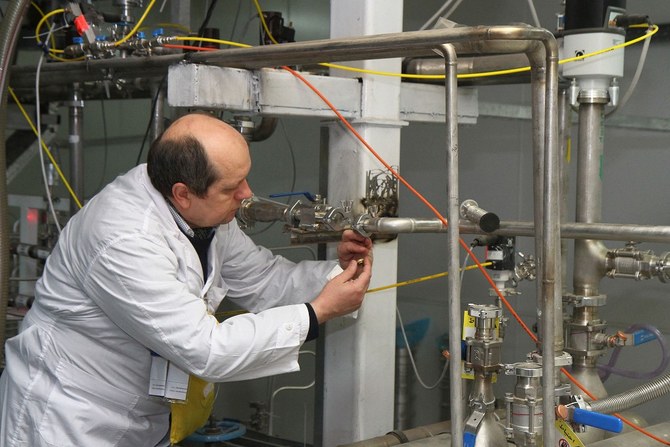WASHINGTON: US Secretary of State Mike Pompeo said Friday that Iran’s latest reduction in commitments to a nuclear deal — made in retaliation for US sanctions — was “unacceptable.”
“They announced... that they’re going to continue to do more research and development on their nuclear weapon systems. Those things are unacceptable,” Pompeo told Kansas City radio station KCMO.
Iranian President Hassan Rouhani made the announcement Wednesday and the country’s atomic energy organization is set to hold a press conference on Saturday, as Tehran shows its frustration with the 2015 deal.
Iran has been negotiating with European powers that hope to salvage the accord despite the reimposition of sanctions by the United States, which last year pulled out of the deal.
Despite his hawkish stance, President Donald Trump has said he is willing to speak with Iran, a prospect proposed by France.
“For months now President Trump has said that he’d be happy to meet with Iranian leadership with no preconditions. But our outcome from those conversations is also unambiguous,” Pompeo said.
In addition to ending the nuclear steps, Pompeo said the United States wanted Iran to end its “terror campaigns” through proxy groups and its development of missiles.
Iran has already taken a series of small but symbolic steps to reduce compliance with the 2015 deal, in which it sharply curtailed its nuclear work in return for promises of sanctions relief.
IAEA role in verifying Iran nuclear deal
On Friday, the European Commission emphasised its reliance on the UN's nuclear watchdog being able to monitor Iran's activities as it voiced "great concern" at Tehran's shrinking back from the nuclear accord.
The International Atomic Energy Agency (IAEA) has a "key role... in monitoring and verifying the implementation by Iran of the nuclear commitments" under the 2015 accord with world powers, Commission spokeswoman Maja Kocijancic told a media briefing.
"Our commitment to the nuclear deal depends on full compliance by Iran," she said, adding that the EU based its assessment of that "on the reports done by the International Atomic Energy Agency".
The IAEA in its latest report, on August 30, said it continues to verify compliance through cameras and on-site inspections. But in an apparent hint at worries about access it said "ongoing interactions ... require full and timely cooperation by Iran".
Iran sent a letter to the EU's top foreign policy official Federica Mogherini detailing its latest cut to the terms of the accord.
Kocijancic said that "we note with great concern that announcement made by Iran in the letter".
She reiterated the Commission's exhortation that Iran "reverse all activities that are inconsistent with its commitments... and to refrain from any further measures that undermine the preservation and full implementation of the nuclear deal."
She also noted that an initiative by European powers Britain, Germany and France to provide a financial channel for Iran immune from US sanctions -- a "special purpose vehicle" known as INSTEX -- had started to process payments.
Iran argues that Europe is not doing enough to shield its vital oil sales from the US sanctions and that it is therefore justified in pulling back, bit-by-bit, from the nuclear accord.

























